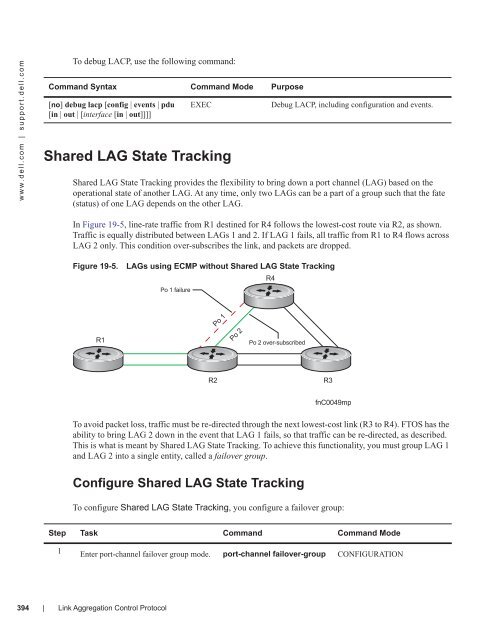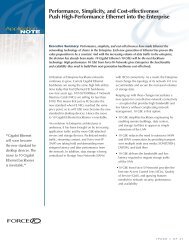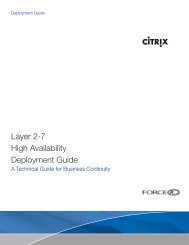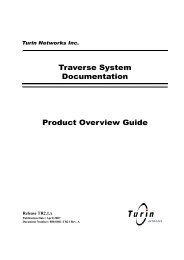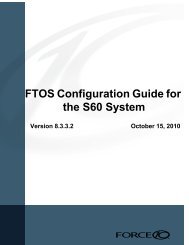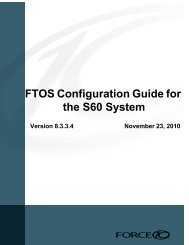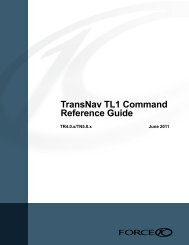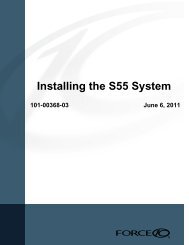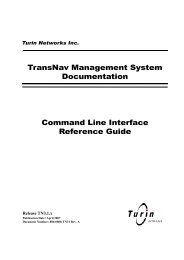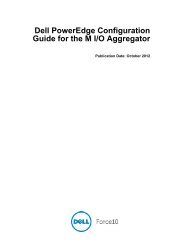- Page 1 and 2:
FTOS Configuration Guide for the S6
- Page 3 and 4:
1 About this Guide . . . . . . . .
- Page 5 and 6:
Linktrace Message and Response . .
- Page 7 and 8:
Jumpstart mode . . . . . . . . . .
- Page 9 and 10:
Viewing IGMP Enabled Interfaces . .
- Page 11 and 12:
17 IPv6 Addressing. . . . . . . . .
- Page 13 and 14:
TIA-1057 (LLDP-MED) Overview . . .
- Page 15 and 16:
Configure a Static Rendezvous Point
- Page 17 and 18:
Honor the incoming dot1p value . .
- Page 19 and 20:
Implementation Information . . . .
- Page 21 and 22:
42 System Time and Date . . . . . .
- Page 23 and 24:
About this Guide Objectives 1 This
- Page 25 and 26:
Configuration Fundamentals The FTOS
- Page 27 and 28:
Figure 2-2. CLI Modes in FTOS EXEC
- Page 29 and 30:
Table 2-1. FTOS Command Modes CLI C
- Page 31 and 32:
Obtaining Help Obtain a list of key
- Page 33 and 34:
Filtering show Command Outputs Filt
- Page 35 and 36:
Getting Started This chapter contai
- Page 37 and 38:
Table 3-1. Pin Assignments Between
- Page 39 and 40:
Figure 3-1. Completed Boot Process
- Page 41 and 42:
Configure the Management Port IP Ad
- Page 43 and 44:
Configure the Enable Password Acces
- Page 45 and 46:
Figure 3-4 shows an example of usin
- Page 47 and 48:
The output of the command dir also
- Page 49 and 50:
Figure 3-9. Alternative Storage Loc
- Page 51 and 52:
Management Management is supported
- Page 53 and 54:
Task Command Syntax Command Mode Al
- Page 55 and 56:
Apply a Privilege Level to a Userna
- Page 57 and 58:
Send System Messages to a Syslog Se
- Page 59 and 60:
Figure 4-2. show logging Command Ex
- Page 61 and 62:
Synchronize log messages You can co
- Page 63 and 64:
Enable FTP server To enable the sys
- Page 65 and 66:
To apply an IP ACL to a line: Task
- Page 67 and 68:
To change the timeout period or dis
- Page 69 and 70:
If any user is already in CONFIGURA
- Page 71 and 72:
Recovering from a Failed Start on t
- Page 73 and 74:
802.1ag 802.1ag is available only o
- Page 75 and 76:
These roles define the relationship
- Page 77 and 78:
Enable Ethernet CFM Task Command Sy
- Page 79 and 80:
Task Command Syntax Command Mode Fo
- Page 81 and 82:
Continuity Check Messages Continuit
- Page 83 and 84:
Figure 5-4. Linktrace Message and R
- Page 85 and 86:
Three values are giving within the
- Page 87 and 88:
802.1X 802.1X is supported on platf
- Page 89 and 90:
3. The authenticator decapsulates t
- Page 91 and 92:
Configuring 802.1X Configuring 802.
- Page 93 and 94:
Figure 6-6. Verifying 802.1X Interf
- Page 95 and 96:
Forcibly Authorizing or Unauthorizi
- Page 97 and 98:
Configuring Timeouts If the supplic
- Page 99 and 100:
Figure 6-11. Dynamic VLAN Assignmen
- Page 101 and 102:
Figure 6-13. Configuring an Authent
- Page 103 and 104:
Access Control Lists (ACL), Prefix
- Page 105 and 106:
CAM optimization is supported on pl
- Page 107 and 108:
V Implementing ACLs on FTOS One IP
- Page 109 and 110:
• Loopback interfaces do not supp
- Page 111 and 112:
Step Command Syntax Command Mode Pu
- Page 113 and 114:
Configure an extended IP ACL Extend
- Page 115 and 116:
Figure 7-7. Command Example: seq Fo
- Page 117 and 118:
For information on MAC ACLs, refer
- Page 119 and 120:
Figure 7-10. Creating an Ingress AC
- Page 121 and 122:
Configuring ACLs to Loopback ACLs c
- Page 123 and 124:
The following rules apply to prefix
- Page 125 and 126:
Figure 7-14. Prefix List Force10(co
- Page 127 and 128:
To view the configuration, use the
- Page 129 and 130:
Figure 7-20. Resequencing Remarks F
- Page 131 and 132:
Figure 7-21. Command Example: show
- Page 133 and 134:
Also, if there are different instan
- Page 135 and 136:
Command Syntax Command Mode Purpose
- Page 137 and 138:
Border Gateway Protocol IPv4 (BGPv4
- Page 139 and 140:
A stub AS is one that is connected
- Page 141 and 142:
In order to make decisions in its o
- Page 143 and 144:
BGP Attributes Routes learned via B
- Page 145 and 146:
• AS_CONFED_SEQUENCE has a path l
- Page 147 and 148:
One AS assigns the MED a value and
- Page 149 and 150:
Next Hop The Next Hop is the IP add
- Page 151 and 152:
Where the 2-Byte format is 1-65535,
- Page 153 and 154:
Figure 8-10. Dynamic changes when b
- Page 155 and 156:
Local-as is prepended before the ro
- Page 157 and 158:
BGP Configuration To enable the BGP
- Page 159 and 160:
Use these commands in the following
- Page 161 and 162:
Figure 8-14 displays two neighbors,
- Page 163 and 164:
Task Command Syntax Command Mode En
- Page 165 and 166:
After you create a peer group, you
- Page 167 and 168:
Figure 8-21. Command example: show
- Page 169 and 170:
Figure 8-22. Command example: show
- Page 171 and 172:
Only after the peer group responds
- Page 173 and 174:
Figure 8-25. Allowas-in information
- Page 175 and 176:
Filter on an AS-Path attribute The
- Page 177 and 178:
Figure 8-27. Filtering with Regular
- Page 179 and 180:
Command Syntax Command Mode Purpose
- Page 181 and 182:
Figure 8-28. Command example: show
- Page 183 and 184:
Step Command Syntax Command Mode Pu
- Page 185 and 186:
Step Command Syntax Command Mode Pu
- Page 187 and 188:
Refer to Chapter 7, “Access Contr
- Page 189 and 190:
Step Command Syntax Command Mode Pu
- Page 191 and 192:
Use the following commands in the C
- Page 193 and 194:
To set dampening parameters via a r
- Page 195 and 196:
Change BGP timers Use either or bot
- Page 197 and 198:
Route map continue The BGP route ma
- Page 199 and 200:
BGP Regular Expression Optimization
- Page 201 and 202:
Figure 8-34. Viewing the Last Bad P
- Page 203 and 204:
With full internet feed (205K) capt
- Page 205 and 206:
Figure 8-38. Enable BGP - Router 1
- Page 207 and 208:
Figure 8-40. Enable BGP - Router 3
- Page 209 and 210:
Figure 8-42. Enable Peer Groups - R
- Page 211 and 212:
Figure 8-44. Enable Peer Group - Ro
- Page 213 and 214:
Bare Metal Provisioning 2.0 Bare Me
- Page 215 and 216:
To display the currently configured
- Page 217 and 218:
Following is an example of a config
- Page 219 and 220:
2. The switch sends DHCP Discover o
- Page 221 and 222:
Content Addressable Memory Content
- Page 223 and 224:
Table 10-1. CAM Profile Description
- Page 225 and 226:
The Layer 2 ACL CAM partition has s
- Page 227 and 228:
When to Use CAM Profiling The CAM p
- Page 229 and 230:
You must save the new CAM settings
- Page 231 and 232:
Figure 10-6. View CAM-ACl settings
- Page 233 and 234:
• The IPv4Flow configuration is a
- Page 235 and 236:
L2PT 13 FRRP 5 You can re-configure
- Page 237 and 238:
Figure 10-11. Returning to the defa
- Page 239 and 240:
QoS CAM Region Limitation The defau
- Page 241 and 242:
Skippy812 11 Dynamic Host Configura
- Page 243 and 244:
Assigning an IP Address using DHCP
- Page 245 and 246:
Configure the System to be a DHCP S
- Page 247 and 248:
Specify a Default Gateway The IP ad
- Page 249 and 250:
Create Manual Binding Entries An ad
- Page 251 and 252:
To view the ip helper-address confi
- Page 253 and 254:
Binding table entries are deleted w
- Page 255 and 256:
Dynamic ARP Inspection Dynamic ARP
- Page 257 and 258:
Use show arp inspection statistics
- Page 259 and 260:
Step Task Command Syntax Command Mo
- Page 261 and 262:
Force10 Resilient Ring Protocol For
- Page 263 and 264:
If the Master node does not receive
- Page 265 and 266:
• Multiple physical rings can be
- Page 267 and 268:
• The Control VLAN is used to car
- Page 269 and 270:
Step Command Syntax Command Mode Pu
- Page 271 and 272:
Command Syntax Command Mode Purpose
- Page 273 and 274:
R1 MASTER interface GigabitEthernet
- Page 275 and 276:
GARP VLAN Registration Protocol GAR
- Page 277 and 278:
Figure 13-2. GVRP Configuration Ove
- Page 279 and 280:
Based on the configuration in the e
- Page 281 and 282:
Internet Group Management Protocol
- Page 283 and 284:
Response Timers on page 288 for how
- Page 285 and 286:
Figure 14-4. IGMP Membership Report
- Page 287 and 288:
Figure 14-6. Viewing IGMP-enabled I
- Page 289 and 290:
2. When a router receives a query i
- Page 291 and 292:
Figure 14-10. Enabling IGMP Snoopin
- Page 293 and 294:
Interfaces 15 This chapter describe
- Page 295 and 296:
Figure 15-1. show interfaces Comman
- Page 297 and 298:
To confirm that the interface is en
- Page 299 and 300:
For information on enabling and con
- Page 301 and 302:
To configure a Management interface
- Page 303 and 304:
VLAN Interfaces VLANs are logical i
- Page 305 and 306:
Port Channel Interfaces Port channe
- Page 307 and 308:
The common speed is determined when
- Page 309 and 310:
Figure 15-10. show interfaces port-
- Page 311 and 312:
Figure 15-13. Command Example from
- Page 313 and 314:
Load balancing through port channel
- Page 315 and 316:
IPv4, IPv6, and non-IP traffic hand
- Page 317 and 318:
• lsb — always uses the least s
- Page 319 and 320:
Overlap port ranges If overlapping
- Page 321 and 322:
Monitor interface statistics with t
- Page 323 and 324:
To test the condition of cables on
- Page 325 and 326:
When an E300 system boots up and a
- Page 327 and 328:
Figure 15-30. Clearing Dampening Co
- Page 329 and 330:
Enable Pause Frames Note: On the C-
- Page 331 and 332:
Port-pipes A port pipe is a Dell Fo
- Page 333 and 334:
Note: The show interfaces status co
- Page 335 and 336:
Figure 15-34. show Commands with co
- Page 337 and 338:
• L2ACL • L2FIB For remaining a
- Page 339 and 340:
IPv4 Addressing IPv4 Addressing is
- Page 341 and 342:
To assign an IP address to an inter
- Page 343 and 344: Figure 16-3. show ip route static C
- Page 345 and 346: Command Syntax Command Mode Purpose
- Page 347 and 348: In FTOS, Proxy ARP enables hosts wi
- Page 349 and 350: Command Syntax Command Mode Purpose
- Page 351 and 352: Configurable ARP Retries ICMP In FT
- Page 353 and 354: Important Points to Remember about
- Page 355 and 356: 2. If UDP helper (using the command
- Page 357 and 358: Troubleshooting UDP Helper Display
- Page 359 and 360: IPv6 Addressing IPv6 Addressing, ap
- Page 361 and 362: IPv6 Headers The IPv6 header has a
- Page 363 and 364: Table 17-1. Next Header field value
- Page 365 and 366: • 2001:0db8:0000:0000:0000:0000:1
- Page 367 and 368: Table 17-2. FTOS and IPv6 Feature S
- Page 369 and 370: Path MTU (Maximum Transmission Unit
- Page 371 and 372: • Multicast Listener Discovery Pr
- Page 373 and 374: Figure 17-5. Command Example: show
- Page 375 and 376: Assign a Static IPv6 Route IPv6 Sta
- Page 377 and 378: Command Syntax Command Mode Purpose
- Page 379 and 380: Figure 17-7 illustrates the show ip
- Page 381 and 382: Command Syntax Command Mode Purpose
- Page 383 and 384: iSCSI Optimization iSCSI Optimizati
- Page 385 and 386: The following message is displayed
- Page 387 and 388: Default iSCSI Optimization Values T
- Page 389 and 390: Link Aggregation Control Protocol L
- Page 391 and 392: FTOS supports LAGs in the following
- Page 393: Set the LACP long timeout PDUs are
- Page 397 and 398: Figure 19-10. Enabling Hitless LACP
- Page 399 and 400: Figure 19-14. Inspecting Configurat
- Page 401 and 402: Summary of the configuration on ALP
- Page 403 and 404: Figure 19-18. Using the show interf
- Page 405 and 406: Figure 19-20. Using the show lacp C
- Page 407 and 408: Layer 2 Layer 2 features are suppor
- Page 409 and 410: Display the MAC Address Table To di
- Page 411 and 412: mac learning-limit no-station-move
- Page 413 and 414: An individual MAC learning limit ca
- Page 415 and 416: When NIC teaming is employed, consi
- Page 417 and 418: Configuring the Switch for Microsof
- Page 419 and 420: • You may not enable any Layer 2
- Page 421 and 422: Figure 20-10. Configuring Far-end F
- Page 423 and 424: Step Task Command Syntax Command Mo
- Page 425 and 426: During an RPM Failover In the event
- Page 427 and 428: Link Layer Discovery Protocol Link
- Page 429 and 430: Management TLVs A Management TLV is
- Page 431 and 432: TIA Organizationally Specific TLVs
- Page 433 and 434: LLDP-MED Network Policies TLV A net
- Page 435 and 436: • Viewing Information Advertised
- Page 437 and 438: • If you configure an interface,
- Page 439 and 440: Figure 21-12. Viewing All Informati
- Page 441 and 442: Figure 21-14. Configuring LLDPDU Tr
- Page 443 and 444: Figure 21-16. debug lldp detail—L
- Page 445 and 446:
Table 21-8. LLDP System MIB Objects
- Page 447 and 448:
Table 21-10. LLDP-MED System MIB Ob
- Page 449 and 450:
Multiple Spanning Tree Protocol Mul
- Page 451 and 452:
• Preventing Network Disruptions
- Page 453 and 454:
Influence MSTP Root Selection MSTP
- Page 455 and 456:
Task Command Syntax Command Mode Ch
- Page 457 and 458:
To enable EdgePort on an interface,
- Page 459 and 460:
Figure 22-10. Router 1 Running-conf
- Page 461 and 462:
Figure 22-12. Router 3 Running-conf
- Page 463 and 464:
Figure 22-14. Displaying BPDUs and
- Page 465 and 466:
Multicast Features Multicast Featur
- Page 467 and 468:
Implementation Information • Beca
- Page 469 and 470:
• If the limit is decreased after
- Page 471 and 472:
Rate Limit IGMP Join Requests If yo
- Page 473 and 474:
Prevent a PIM Router from Processin
- Page 475 and 476:
Multicast Traceroute Multicast Trac
- Page 477 and 478:
FTOS provides the ability to adjust
- Page 479 and 480:
24 Open Shortest Path First (OSPFv2
- Page 481 and 482:
Figure 24-1. Autonomous System Area
- Page 483 and 484:
Figure 24-2. OSPF Routing Examples
- Page 485 and 486:
Link-State Advertisements (LSAs) A
- Page 487 and 488:
Figure 24-3. Priority and Costs Exa
- Page 489 and 490:
Multi-Process OSPF allows multiple
- Page 491 and 492:
To ensure equal intervals between t
- Page 493 and 494:
Return to CONFIGURATION mode to ena
- Page 495 and 496:
In CONFIGURATION ROUTER OSPF mode,
- Page 497 and 498:
Loopback interfaces also assist in
- Page 499 and 500:
Use the following command in the RO
- Page 501 and 502:
Figure 24-14 shows the convergence
- Page 503 and 504:
Figure 24-16. Changing the OSPF Cos
- Page 505 and 506:
Figure 24-17. Command Example: show
- Page 507 and 508:
Filter routes To filter routes, use
- Page 509 and 510:
Troubleshooting OSPFv2 FTOS has sev
- Page 511 and 512:
Use the following command in EXEC P
- Page 513 and 514:
Assign OSPFv3 Process ID and Router
- Page 515 and 516:
Redistribute routes You can add rou
- Page 517 and 518:
Use the following command in EXEC P
- Page 519 and 520:
PIM Sparse-Mode PIM Sparse-Mode is
- Page 521 and 522:
source, including the RP, create an
- Page 523 and 524:
Figure 25-3. Viewing the PIM Multic
- Page 525 and 526:
Override Bootstrap Router Updates P
- Page 527 and 528:
Enable PIM-SM graceful restart (non
- Page 529 and 530:
PIM Source-Specific Mode PIM Source
- Page 531 and 532:
Implementation Information • The
- Page 533 and 534:
• When an extended ACL is associa
- Page 535 and 536:
Figure 26-4. Configuring PIM-SSM wi
- Page 537 and 538:
Power over Ethernet Power over Ethe
- Page 539 and 540:
Related Configuration Tasks • Man
- Page 541 and 542:
View the total power consumption of
- Page 543 and 544:
Extended Power-via-MDI TLV The PD s
- Page 545 and 546:
Manage Power Priorities PoE-enabled
- Page 547 and 548:
Figure 27-6. Order of PoE Re-Supply
- Page 549 and 550:
Figure 27-9. LLDP Configuration for
- Page 551 and 552:
Port Monitoring Port Monitoring is
- Page 553 and 554:
On the E-Series TeraScale, FTOS sup
- Page 555 and 556:
Figure 28-4. Number of Monitoring P
- Page 557 and 558:
Figure 28-7. Port Monitoring Exampl
- Page 559 and 560:
Figure 28-8. Configuring Flow-based
- Page 561 and 562:
Private VLANs FTOS 7.8.1.0 adds a P
- Page 563 and 564:
Each of the port types can be any t
- Page 565 and 566:
Creating a Primary VLAN A primary V
- Page 567 and 568:
Figure 29-2. Configuring VLANs for
- Page 569 and 570:
• show vlan private-vlan mapping:
- Page 571 and 572:
Per-VLAN Spanning Tree Plus Per-VLA
- Page 573 and 574:
• PVST+ in Multi-vendor Networks
- Page 575 and 576:
Figure 30-4. Display the PVST+ Forw
- Page 577 and 578:
Task Command Syntax Command Mode Ch
- Page 579 and 580:
Figure 30-5. PVST+ with Extend Syst
- Page 581 and 582:
Figure 30-7. PVST+ Sample Configura
- Page 583 and 584:
Quality of Service Quality of Servi
- Page 585 and 586:
Figure 31-1. Dell Force10 QoS Archi
- Page 587 and 588:
On the C-Series and S-Series you ca
- Page 589 and 590:
Figure 31-7. Displaying How Your Ra
- Page 591 and 592:
Figure 31-10. Using the Order Keywo
- Page 593 and 594:
FTOS Behavior: An explicit “deny
- Page 595 and 596:
Figure 31-12. Marking DSCP Values f
- Page 597 and 598:
Create Input Policy Maps There are
- Page 599 and 600:
By default, if no match occurs, the
- Page 601 and 602:
Apply an output QoS policy to a que
- Page 603 and 604:
You can create a custom WRED profil
- Page 605 and 606:
Figure 31-15. show qos statistics C
- Page 607 and 608:
• Status indicates whether or not
- Page 609 and 610:
Figure 31-19. Classifying VOIP Traf
- Page 611 and 612:
Routing Information Protocol Routin
- Page 613 and 614:
Configuration Task List for RIP •
- Page 615 and 616:
Control RIP routing updates By defa
- Page 617 and 618:
Figure 32-3 shows an example of the
- Page 619 and 620:
Summarize routes Routes in the RIPv
- Page 621 and 622:
Configuring RIPv2 on Core 2 Figure
- Page 623 and 624:
RIP Configuration on Core 3 Figure
- Page 625 and 626:
RIP Configuration Summary Figure 32
- Page 627 and 628:
Remote Monitoring Remote Monitoring
- Page 629 and 630:
Set rmon alarm To set an alarm on a
- Page 631 and 632:
Figure 33-2. rmon event Command Exa
- Page 633 and 634:
Rapid Spanning Tree Protocol Rapid
- Page 635 and 636:
To configure the interfaces for Lay
- Page 637 and 638:
Figure 34-5. show spanning-tree rst
- Page 639 and 640:
Table 34-2 displays the default val
- Page 641 and 642:
FTOS Behavior: Regarding bpduguard
- Page 643 and 644:
Security Security features are supp
- Page 645 and 646:
Suppress AAA Accounting for null us
- Page 647 and 648:
Configure login authentication for
- Page 649 and 650:
To use local authentication for ena
- Page 651 and 652:
To configure a username and passwor
- Page 653 and 654:
Step Command Syntax Command Mode Pu
- Page 655 and 656:
To move to a lower privilege level,
- Page 657 and 658:
• Monitor RADIUS on page 659 (opt
- Page 659 and 660:
To set global communication paramet
- Page 661 and 662:
Figure 35-4. Failed Authentication
- Page 663 and 664:
To delete a TACACS+ server host, us
- Page 665 and 666:
Figure 35-6. Specifying an SSH vers
- Page 667 and 668:
Figure 35-8. Enabling SSH Password
- Page 669 and 670:
Figure 35-12. Client-based SSH Auth
- Page 671 and 672:
Since traffic passes through the fi
- Page 673 and 674:
Figure 35-13. Trace list Using seq
- Page 675 and 676:
Figure 35-14. Trace List Example Fo
- Page 677 and 678:
Figure 35-16. Example Access-Class
- Page 679 and 680:
Service Provider Bridging Service P
- Page 681 and 682:
Create Access and Trunk Ports An ac
- Page 683 and 684:
FTOS Options for Trunk Ports 802.1a
- Page 685 and 686:
Figure 36-6. TPID Match and First-b
- Page 687 and 688:
Figure 36-8. First-byte TPID Match
- Page 689 and 690:
Figure 36-10. Single and Double-tag
- Page 691 and 692:
Enable Drop Eligibility You must en
- Page 693 and 694:
Figure 36-12. Statically and Dynami
- Page 695 and 696:
To map C-Tag dot1p values to S-Tag
- Page 697 and 698:
Figure 36-14. VLAN Stacking with L2
- Page 699 and 700:
Debug Layer 2 Protocol Tunneling Ta
- Page 701 and 702:
sFlow Configuring sFlow is supporte
- Page 703 and 704:
• FTOS exports all sFlow packets
- Page 705 and 706:
Figure 37-3. Command Example: show
- Page 707 and 708:
The sflow sample-rate command, when
- Page 709 and 710:
Figure 37-6. Confirming that Extend
- Page 711 and 712:
Simple Network Management Protocol
- Page 713 and 714:
View your SNMP configuration, using
- Page 715 and 716:
Task Command Command Mode Identify
- Page 717 and 718:
Table 38-2. Dell Force10 Enterprise
- Page 719 and 720:
The relevant MIBs for these functio
- Page 721 and 722:
Table 38-4. Copying Configuration F
- Page 723 and 724:
Dell Force10 provides additional MI
- Page 725 and 726:
Figure 38-16. Assign a VLAN Alias u
- Page 727 and 728:
The value 40 is in the first set of
- Page 729 and 730:
Each object is comprised an OID con
- Page 731 and 732:
Figure 38-27. Binary Representation
- Page 733 and 734:
Spanning Tree Protocol Spanning Tre
- Page 735 and 736:
Configuring Interfaces for Layer 2
- Page 737 and 738:
Figure 39-4. Spanning Tree Enabled
- Page 739 and 740:
Modifying Global Parameters You can
- Page 741 and 742:
To enable PortFast on an interface:
- Page 743 and 744:
Figure 39-8. Enabling BPDU Guard Fo
- Page 745 and 746:
Stacking S-Series Switches Stacking
- Page 747 and 748:
Figure 40-2. Electing the Stack Man
- Page 749 and 750:
Figure 40-4. Adding a Standalone wi
- Page 751 and 752:
Figure 40-6. Adding a Standalone wi
- Page 753 and 754:
You may stack any combination of S-
- Page 755 and 756:
Figure 40-11. Stacking Cable Redund
- Page 757 and 758:
Figure 40-13. Adding a Stack Unit w
- Page 759 and 760:
Figure 40-16. Removing a Stack Memb
- Page 761 and 762:
Split an S-Series Stack To split a
- Page 763 and 764:
Figure 40-18. Displaying Informatio
- Page 765 and 766:
Influence Management Unit Selection
- Page 767 and 768:
Figure 40-21. Recovering from a Sta
- Page 769 and 770:
Storm Control Storm Control is supp
- Page 771 and 772:
System Time and Date 42 Chapter 42,
- Page 773 and 774:
Figure 42-1. NTP Fields Leap Indica
- Page 775 and 776:
Set the Hardware Clock with the Tim
- Page 777 and 778:
Configure NTP authentication NTP au
- Page 779 and 780:
• Root Delay (sys.rootdelay, peer
- Page 781 and 782:
The software clock runs only when t
- Page 783 and 784:
Set Daylight Saving Time Once Set a
- Page 785 and 786:
Command Syntax Command Mode Purpose
- Page 787 and 788:
Upgrade Procedures Find the upgrade
- Page 789 and 790:
Virtual LANs (VLAN) VLANs are suppo
- Page 791 and 792:
Untagged interfaces must be part of
- Page 793 and 794:
Figure 44-3. show vlan Command Exam
- Page 795 and 796:
Use the untagged command to move un
- Page 797 and 798:
Native VLAN support breaks this bar
- Page 799 and 800:
Virtual Router Redundancy Protocol
- Page 801 and 802:
VRRP Benefits With VRRP configured
- Page 803 and 804:
Task Command Syntax Command Mode Fi
- Page 805 and 806:
Figure 45-6. Command Example Displa
- Page 807 and 808:
Configure simple authentication wit
- Page 809 and 810:
Figure 45-13. Command Example: adve
- Page 811 and 812:
Figure 45-17. Configure VRRP Router
- Page 813 and 814:
S-Series Debugging and Diagnostics
- Page 815 and 816:
Figure 46-2. Verifying the Offline/
- Page 817 and 818:
Figure 46-5. Viewing the Results of
- Page 819 and 820:
Table 46-2. show hardware Commands
- Page 821 and 822:
Table 46-3 describes the type and n
- Page 823 and 824:
Buffer tuning commands Task Command
- Page 825 and 826:
Using a pre-defined buffer profile
- Page 827 and 828:
The S60 switch has two ASICS; each
- Page 829 and 830:
Figure 46-14. Displaying Drop Count
- Page 831 and 832:
Displaying Stack Port Statistics Th
- Page 833 and 834:
Figure 46-19. Mini application core
- Page 835 and 836:
Standards Compliance This appendix
- Page 837 and 838:
General IPv4 Protocols RFC# Full Na
- Page 839 and 840:
Border Gateway Protocol (BGP) RFC#
- Page 841 and 842:
Intermediate System to Intermediate
- Page 843 and 844:
Multicast RFC# Full Name S-Series C
- Page 845 and 846:
Network Management (continued) RFC#
- Page 847 and 848:
IEEE 802.1AB The LLDP Management In
- Page 849 and 850:
MIB Location Force10 MIBs are under
- Page 851 and 852:
Index Numerics 10/100/1000 Base-T E
- Page 853 and 854:
FRRP 261 FRRP Master Node 261 FRRP
- Page 855 and 856:
MTU Size, Configuring on an Interfa
- Page 857 and 858:
show ip ssh command 664 show ip ssh


